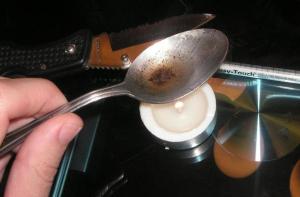The drug czar's office is making misleading claims about the origin of heroin addiction, and that has consequences.
A sticky-fingered Louisiana lawman heads for prison, so does a cocaine distributing Texas bailiff, and more.
Colorado has raked in a billion dollars in cannabis tax revenues, Cincinnati decriminalizes, Bonaroo harm reduction protest, Pompeo pushes Colombia coca crop spraying, and more.
The New York legislature has less than a week to get marijuana legalization done, a bid to open research on Schedule I drugs dies in the House, the Brazilian government appears to be suppressing a drug use survey that undercuts its war on drugs, and more.
California officials are cutting legal operators some slack in a bid to boost the marijuana industry, Virginia's attorney general calls for marijuana decriminalization, West Virginia is demanding students seeking free community college tuition undergo drug testing, and more.
New York lawmakers only have until tomorrow to pass a marijuana legalization bill, China gripes about legalization in the US and Canada, the movement to decriminalize psychedelics is spreading, and more.
The House could vote on a series of marijuana amendments soon, New York's bid to legalize marijuana this year runs out of time, Colombia's president says the spraying of coca crops (and farmers) with herbicides will recommence soon, and more.
Corey Booker wants to grant clemency to thousands of federal drug prisoners, a pair of drug reform amendments pass the House, the Russians move to start cultivating marijuana and opium, and more.
As part of its campaign to stem opioid addiction and overdoses, the White House Office of National Drug Control Policy (ONDCP -- the drug czar's office) has launched an education campaign called The Truth About Opioids, but some of the material it is presenting has more than a whiff of spin to it -- and could imperil the ability of pain patients to get the relief they need.

Most addicts didn't go from the doctor's office to the needle and spoon, a new study reports. (Wikimedia)
The web site declares in big, bold letters that "
80% of heroin users started with a prescription painkiller," and highlights the words "80%," "heroin," "started," and "prescription" in lurid purple. The graphic suggests that heroin users were
prescribed opioids, developed a habit, and then went on to junk, with the further implication that a way to reduce heroin addiction is to tighten and reduce the prescribing of opioids.
The web site then asks readers if they are "shocked," "ah-ha," "outraged," or "fired up" by the information. It is only if readers scroll down the page that they are informed that the basis for the statistic is a 2013 study of "Heroin use and heroin use risk behaviors among nonmedical users of prescription opioid pain relievers." (Emphasis added.)
That's right, even though the graphic shouts out that people prescribed opioids then went on to become heroin addicts, the science it uses to back its claim is about recreational pain pill users. That's deceptive.
Misleading claims about prescribing opioids and the potential for opioid addiction are, of course, nothing new. Twenty years ago, PurduePharma infamously claimed that the risk of addiction from OxyContin was so low as to be negligible, a marketing tactic that helped kick into overdrive the pain pill phase of the current wave of opioid use.
But the drug czar's office, with its misleading suggestion that being prescribed opioids leads to heroin addiction, tips the pendulum too far in the other direction. There are real world consequences to using such faulty information. The Drug Enforcement Administration cited that 80% figure last year when it ordered steep decreases in the supply of prescription opioids, and it claimed in the Federal Register that patients got addicted "after first obtaining these drugs from their health care providers."
"The 80% statistic is misleading and encourages faulty assumptions about the overdose crisis and medical care," Pain News Network columnist Roger Chriss argued in a column last year.
And now, a new study from researchers at Penn State University published in the Journal of Addictive Studies bolsters that claim. Concentrating on southwestern Pennsylvania, an area with high levels of addiction, the researchers conducted surveys and in-depth interviews with drug users to determine their drug using histories. The sample size was small, with 125 people surveyed and 30 interviewed, but the results were illuminating.
The researchers found that two out of three of those interviewed got their first prescription opioids not from a doctor's prescription, but either bought or stole it from a family member or friend. Another 7 percent bought their drugs from a stranger or a dealer. And only one out of four (26 percent) began with opioid medications prescribed by a doctor.
"What emerged from our study -- and really emerged because we decided to do these qualitative interviews in addition to a survey component -- was a pretty different narrative than the national one. There's a lot about that narrative that I think is an overly simplistic way of thinking about this," said lead author Ashton Verdery, PhD, an assistant professor of sociology, demography and social data analytics at Penn State.
"We found that most people initiated through a pattern of recreational use because of people around them. They got them from either siblings, friends or romantic partners," he continued. "Participants repeatedly reported having a peer or caregiver in their childhood who had a substance use problem. Stories from childhood of witnessing one of these people selling, preparing, or using drugs were very common. Being exposed to others' substance use at an early age was often cited as a turning point for OMI (opioid misuse) and of drug use in general."
Among study participants, recreational drug use -- or polysubstance abuse, in public health speak -- was common, Verdery noted, and usually began not with prescription opioids but with drugs such as alcohol, marijuana, cocaine, methamphetamine, and prescription sedatives and stimulants.
"It is important to note that interviewees universally reported initiating OMI only after previously starting their substance use career with another drug (e.g., alcohol, marijuana, cocaine). Opioids were never the first drug used, suggesting that OMI is likely associated with being further along in one's drug using career," he added.
Researchers studying opioid addiction need to be aware of the role other substances play in the process, Verdery said. Understanding how opioid addiction is intertwined with other drug use is necessary to figure out the correct steps to take to prevent addiction before it takes hold.
"We think that understanding this mechanism as a potential pathway is worth further consideration," said Verdery. "It's not just that people were prescribed painkillers from a doctor for a legitimate reason and, if we just crack down on the doctors who are prescribing in these borderline cases, we can reduce the epidemic."
It's not nice for the drug czar's office to promulgate deceptive and misleading information about why people are getting strung out on heroin. It results both in limitation on access to opioid pain medications for those who need them and in obfuscating the realities of how heroin addiction happens -- and how best to deal with it.
back to top
A sticky-fingered Louisiana lawman heads for prison, so does a cocaine distributing Texas bailiff, and more. Let's get to it:
In Edinburg, Texas,
a former Hidalgo County bailiff was sentenced Monday to five years in prison after being convicted of conspiracy to distribute narcotics. Oscar De La Cruz was arrested in May 2018 during an FBI raid amid accusations that he helped traffic more than five kilograms of cocaine.
In Kingman, Arizona, a former Mojave County jail guard was sentenced last Friday to two years in state prison for smuggling drugs and tobacco to her boyfriend and another inmate at the jail. Ashley Aquino, 24, entered a plea agreement convicting her of promoting prison contraband. The boyfriend and the other inmate also face charges.
In Covington, Louisiana, a former St. Tammany Parish police officer was sentenced last Thursday to four years in prison for stealing cocaine, cash, and guns from the department evidence room. William Jones Jr., 46, was convicted of making off with $6,300 cash, two guns, and an unspecified amount of cocaine in a trial in May.
back to top
Colorado has raked in a billion dollars in cannabis tax revenues, Cincinnati decriminalizes, Bonaroo harm reduction protest, Pompeo pushes Colombia coca crop spraying, and more.

Is this truck driver "an illicit drug user"? A trucking group says hundreds of thousands are. (Creative Commons)
Colorado Hits $1 Billion in Marijuana Tax Revenues. The state Department of Revenue reported this week that tax revenues from marijuana sales since legalization in 2014 have now topped the one-billion-dollar mark. The department reported tax, license, and fee revenues of $1.02 billion on sales of $6.5 billion. It also reported that the state now has 2,900 licensed marijuana businesses employing 41,000 people.
Nevada Becomes First State to Bar Employers from Refusing to Hire Marijuana Users. Gov. Steve Sisolak (D) last week signed into law AB 132, which bans employers from refusing to hire people who test positive for marijuana on a drug test, making Nevada the first state to do so. "It is unlawful for any employer in this State to fail or refuse to hire a prospective employee because the prospective employee submitted to a screening test and the results of the screening test indicate the presence of marijuana," the law says. There are exceptions for some public safety-related positions. The law goes into effect on January 1.
Cincinnati Decriminalizes. The Cincinnati city council voted 5-3 Wednesday to decriminalize the possession of up to 100 grams of marijuana -- as long as it is not being used in public. There will be no fines, either.
Heroin and Prescription Opioids
Idaho Governor Signs Executive Order on Opioids and Substance Abuse. Gov. Brad Little (R) on Thursday signed into law an executive order aimed at combatting opioid and substance misuse in the state. The order creates an advisory group to study diversion policies for first-time drug offenders, prescription monitoring programs, treatment options, educating the medical community, and a public awareness campaign around opioids.
Asset Forfeiture
Alabama Governor Signs Asset Forfeiture Reform Bill. Gov. Kay Ivey (R) has signed into law SB 191, which does not end civil asset forfeiture in the state but requires that law enforcement report on its asset forfeiture activities.
Foreign Policy
Secretary of State Pompeo Doubles Down on Backing Aerial Coca Spraying in Colombia. Secretary of State Mike Pompeo told the Senate Caucus on International Narcotics Control Tuesday that the US still strongly supports the resumption of the aerial spraying of the pesticide glyphosate on coca fields in Colombia. He neither acknowledged global criticism of the use of glyphosate -- the Colombian constitutional court banned it in 2015 -- nor any other strategy for reducing coca cultivation. Instead, he said spraying is "an important tool they need" to reduce coca production.
Harm Reduction
Harm Reductionists Protest at Bonaroo Over Harassment of Drug Checking Kit Providers. Tennessee's Bonaroo music festival has been plagued by drug overdoses in recent years even though authorities had allowed harm reduction groups such as DanceSafe and the Bunk Police to hand out drug checking kits. But for the past couple of years, police have forced the groups out of the festival, so the Bunk Police have organized a protest Thursday and Friday afternoons to raise awareness of the issue. "We're trying to bring attention to the issue and have them join us and showing that there's a problem and that Bonnaroo could, you know, take action and allow this harm reduction effort, which could allow for a safe environment for the patrons," the Bunk Police said.
Transportation Policy
Trucking Group Demands Purge of 300,000 Truck Drivers as "Illicit Drug Users." Addressing Congress on Thursday, a trucking group composed of some of the industry's largest carriers said it had data indicating as many as 300,000 truck drivers are "manipulating" urine drug testing protocols and should be removed from the nation's highways. The Trucking Alliance told the House Committee on Transportation and Infrastructure that "thousands of commercial truck drivers are illicit drug users" and that they have the drug testing data to back up their claims. They based their data on the number of drivers who passed urine drug tests but either failed or refused to undergo hair drug tests, which can detect the presence of substances for months -- long after they would have any influence on drivers. There is a chronic shortage of drivers in the industry, which other groups testifying attributed in part to the spread of marijuana legalization.
back to top
The New York legislature has less than a week to get marijuana legalization done, a bid to open research on Schedule I drugs dies in the House, the Brazilian government appears to be suppressing a drug use survey that undercuts its war on drugs rationale, and more.

Mexico can produce about 100 metric tons of heroin a year from its opium poppy crop, the drug czar's office says. (UNODC)
Marijuana Legalization Inching Forward in New York. With the legislative session coming to an end next week, Assembly Democrats went into a closed-door conference Thursday evening seeking a path forward. Meanwhile, Senate Democrats have also been discussing the bill these past two days, with those discussions deemed largely positive. Lawmakers have until next Wednesday to get it done.
Drug Policy
House Democrats Join Republicans to Defeat Ocasio-Cortez Amendment to Ease Research Barriers for Schedule I Drugs. A majority of House Democrats joined their GOP colleagues in voting down an amendment that Rep. Alexandria Ocasio-Cortez (D-NY) filed to expand research into the potential benefits of Schedule I substances. The amendment would have removed a longstanding budget rider that bars the use of federal funds for "any activity that promotes the legalization of any drug or other substance in Schedule I." Ocasio-Cortez had pointed to psilocybin and MDMA as examples of understudied drugs, but Schedule I also contains marijuana and heroin. Democrats voted against the measure after the Democratic leadership failed to give members a directive to support it. It was the only amendment not supported by the leadership.
International
Brazilian Government Accused of Suppressing Data That Could Challenge Its War on Drugs. Researchers familiar with a national drug use survey commissioned in 2014 are accusing the government of President Jairo Bolsonaro of suppressing its publication because it contradicts the government's assertion that drug use is a widespread and growing problem in the country. The government argues that the renowned Oswaldo Cruz Foundation (FIOCRUZ) in Rio de Janeiro, which conducted the survey, didn't follow proper methodologies, a claim the foundation strenuously denies. "FIOCRUZ is proud of the work carried out by its researchers and ensures that [the survey] complied with what was proposed in the public notice, respecting all the methodological, scientific and ethical rigor pertinent to this type of study," says a statement released by the foundation on 21 May. Leaked data from the survey found that less than 1% of Brazilians reported ever using crack cocaine -- the main focus of the government's drug war.
back to top
California officials are cutting legal operators some slack in a bid to boost the marijuana industry, Virginia's attorney general calls for marijuana decriminalization, West Virginia is demanding students seeking free community college tuition undergo drug testing, and more.

State officials are easing up on permitting to give the legal industry some breathing room. (Creative Commons)
In Bid to Boost Legal Cannabis Industry, California Plans to Extend Provisional Permits for Growers and Sellers. State officials plan to extend the period that marijuana growers and sellers can operate with provisional licenses by five more years, giving them more time to get in compliance with stricter rules required for regular permits. The state's legal industry is having a hard time getting off the ground in the face of high taxes and stiff regulatory hurdles. Only 208 growers have obtained regular, annual licenses and another 1,532 are operating with provisional permits. That's a tiny fraction of all marijuana growers in the state. Similarly, only 39 marijuana retailers have regular licenses, with another 2,751 operating on provisional or temporary permits.
Virginia Attorney General Calls for Marijuana Decriminalization and Expungement, and Eventual Legalization. Attorney General Mark Herring has called for the decriminalization of small amounts of marijuana, as well as expungement for old marijuana offenses, with an eye toward eventual legalization. "The human and social costs are enormous, in addition to the millions of dollars it costs Virginia taxpayers," Herring wrote in an op-ed Saturday. "And the negative consequences of the current approach fall disproportionately on African Americans and people of color."
Medical Marijuana
Gallup Poll Finds Americans Want CBD OTC. Americans familiar with CBD want it sold over the counter without a prescription by a margin of 61% to 33%, according to a Gallup poll released last Friday. More than a third (36%) of respondents were not familiar with CBD. When they are included, the figure for support for OTC CBD declined to 39%.
Drug Policy
California's Santa Clara County Will Stop Prosecuting People for Minor Drug Offenses. The Santa Clara County (San Jose) District Attorney's Office announced last Friday it will stop prosecuting most minor drug offenses. Only people who already have two drug offenses will be prosecuted under the new policy. "We are drawing a line between public health and public safety," said Brian Buckelew, a Supervising Deputy District Attorney. "If there's no other criminality, if someone is arrested with a meth pipe, or personal use methamphetamine, that person needs treatment. But should that person get treatment in the criminal justice system at great expense to the taxpayers? We have concluded they should not."
Drug Testing
West Virginia Students Will Have to Pass Drug Test to Get Free Tuition at Community Colleges. Students who are expecting free college tuition under the West Virginia Invests program will be required to pass drug tests in order to be eligible. That's after the state Community and Technical College System's board approved the move at a meeting last Thursday. While the law creating the program demanded drug testing, it did not specify which drugs should be tested for. The board decided to test for THC, marijuana's high-inducing ingredient, alongside opiates, oxycodone, hydrocodone, cocaine, amphetamines and other drugs. The policy went through no public comment period, and even one board member questioned why marijuana was on the list.
back to top
New York lawmakers only have until tomorrow to pass a marijuana legalization bill, China gripes about legalization in the US and Canada, the movement to decriminalize psychedelics is spreading, and more.

Interest in psychedelic decriminalization is sprouting up like magic mushrooms. (Creative Commons)
New York Legalization Negotiations Continue as Clock Ticks Down. With the legislative session set to end Wednesday, lawmakers and Gov. Andrew Cuomo (D) are continuing to try to reach an agreement to pass the Marijuana Regulation and Taxation Act. One of the obstacles is disagreement over how and where to allocate marijuana tax revenue, with some progressive legislators pushing for a fixed percentage of revenues going to communities most adversely affected by the war on drugs, while the governor wants more executive branch control over the funds.
Medical Marijuana
Washington State Will Not Ban Sugared Edibles. State regulators are not banning sugared edibles after all. The state Liquor and Cannabis Control Board had announced last fall that it would reevaluate all edible products, especially those that might be appealing to children. But this week the board okayed edibles as long as they conform with appearance and marketing standards designed to avoid enticing children.
Psychedelics
Movement to Decriminalize Psychedelics Spreads Nationally. Decriminalize Nature, the group behind Oakland's successful natural psychedelic decriminalization ordinance, says activists from more than half the states have expressed interest in pursuing similar moves in their cities. With Oakland and Denver leading the way, activists from Berkeley are expressing strong interest, with San Diego and Boston primed to be next. The group has also gotten inquiries from Phoenix, Los Angeles, Eugene, Santa Cruz, Detroit, Chicago, Philadelphia, New York City, Baltimore, and the Hawaiian Islands.
Foreign Policy
Beijing Says US Marijuana Legalization Threatens China. Liu Yuejin, deputy director of the China National Narcotics Control Commission, told a press conference Monday that marijuana legalization in parts of the US and Canada is "a new threat to China." Liu said the number of marijuana users in the country had grown by more than 25% last year, rising to about 24,000 people (which is an incredibly miniscule number in a country of nearly 1.4 billion). "In two years, we have found increasing cannabis trafficked from North America to China," he added, although he did concede there were "few cannabis abusers in China" relative to the total population. China intercepted about 110 pounds of pot in 2018, or 0.00004 grams per person.
back to top
The House could vote on a series of marijuana amendments soon, New York's bid to legalize marijuana this year runs out of time, Colombia's president says the spraying of coca crops (and farmers) with herbicides will recommence soon, and more.

Colombian coca farmer (DEA)
House Rules Committee Sends Marijuana Amendments to Floor Vote. The House Rules Committee approved a series of marijuana amendments on Tuesday, setting them up for a House floor vote. They include a rider blocking the Justice Department from interfering in state-legal marijuana programs, a proposal shielding tribal marijuana laws, and a proposal to let vets receive medical marijuana recommendations from Veterans Affairs doctors. They are all part of an appropriations bill that funds large parts of the federal government.
New York Fails to Legalize Marijuana as Session Ends. The legislative session ended today with lawmakers and Gov. Andrew Cuomo (D) unable to come to an agreement that would allow them to pass the Marijuana Regulation and Taxation Act (SB 1527). Key issues still unresolved included how tax revenues would be spent, whether past marijuana convictions should be expunged, and whether localities could opt out of allowing pot shops or would have to opt in.
Kratom
Oregon Legislature Punts on Regulating Kratom. Lawmakers have mooted a bid to regulate kratom in the state. The Senate Judiciary Committee had amended a series of rules and restrictions on kratom into an unrelated bill in April, but this week, the Joint Ways and Means Committee reversed the earlier action and removed all references to kratom in the bill. That means kratom will remain unregulated -- at least until the next legislative session.
Drug Testing
Maine Repeals Failed Food Stamp Drug Testing Requirement. Gov. Janet Mills (D) on Monday signed into law a bill that repeals the state's controversial and unsuccessful drug testing requirement for Temporary Assistance for Needy Families (TANF) beneficiaries. Since imposed by Tea Party Republican former Gov. Paul LePage in 2015, the program found a total of fewer than ten people who actually tested positive out of thousands forced to submit to the test.
International
Colombia to Resume Aerial Spraying of Coca Crops, President Says. President Ivan Duque has said aerial spraying of coca crops will resume "within weeks," and Defense Minister Guillermo Botero adds that the herbicide glyphosate will be used. But there is an obstacle: The Constitutional Court suspended the practice back in 2015 until the government could convince it the herbicide was safe.
back to top
Cory Booker wants to grant clemency to thousands of federal drug prisoners, a pair of drug reform amendments pass the House, the Russians move to start cultivating marijuana and opium, and more.

Sen. Cory Booker vows to grant clemency to thousands of drug war prisoners if elected president. (Wikimedia)
House Approves Amendments Stripping DEA Funding and Pushing FDA to Regulate CBD. The House on Thursday approved two amendments to appropriations bills, one that would transfer $5 million from the DEA to an opioid treatment program and one that directs the Food and Drug Administration to set regulations for using CBD in foods and dietary supplements. The former amendment was authored by Rep. Alexandria Ocasio-Cortez, who said: "I offer this amendment because ending the war on drugs has to mean changing our priorities in order to keep all communities safe and healthy. The best way we do that is by offering people the help and support they need before arrest and criminalization should be considered in the first place."
Harm Reduction
California Safe Injection Site Bill Bumped to Next Year. A bill that would have allowed San Francisco to launch a pilot safe injection site program has been bumped to next year by its sponsors. AB 362 passed the Assembly earlier this year, but after the Senate referred it to three different committees for review, Assemblywoman Susan Eggman (D-Stockton) and Senator Scott Weiner (D-San Francisco) pulled the bill, saying they needed more time to build alliances to ensure passage next year.
Sentencing Policy
Cory Booker Says He Will Grant Clemency to Thousands of Drug Prisoners. New Jersey senator and 2020 presidential candidate Corey Booker said Wednesday that he is elected, he will grant clemency to nonviolent drug offenders currently sitting in federal prisons. His clemency plan could affect more than 17,000 prisoners in three categories: those doing time for marijuana, those whose sentences would have been reduced if the criminal justice overhaul signed by President Donald Trump last year were applied retroactively, and those affected by the disparity between sentences for possession of crack versus powder cocaine.
International
Official Death Toll in Philippines Drug War Reaches 6,600. The official death toll in President Rodrigo Duterte's bloody war on drugs has reached 6,600, the Philippines National Police reported Thursday. That's up from just under 5,000 in November 2018. Duterte has recently acknowledged both that despite his efforts, drug use has increased in the country, and that the poor are feeling the brunt of the crackdown. Human rights groups put the toll much higher, some as high as 30,000, with killings divided between police and shadowy vigilante groups.
Russian Duma Approves Cultivation of Opium, Other Psychoactive Plants. Citing Western sanctions that threaten its supplies of opioids and other medications, the Russian parliament has approved a bill to allow the cultivation of psychoactive plants, including marijuana and opium poppies. The bill must still be approved by the Federation Council and signed into law by President Vladimir Putin.
(This article was prepared by StoptheDrugWar.org's 501(c)(4) lobbying nonprofit, the Drug Reform Coordination Network, which also pays the cost of maintaining this website. DRCNet Foundation takes no positions on candidates for public office, in compliance with section 501(c)(3) of the Internal Revenue Code and does not pay for reporting that could be interpreted or misinterpreted as doing so.)
back to top






